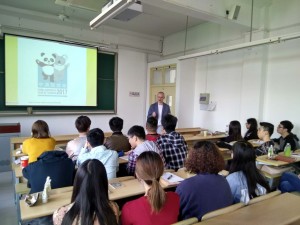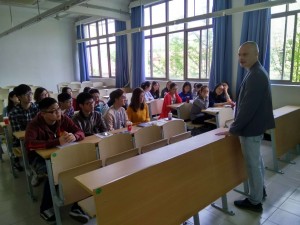Lots of meaty topics for you to chew over this week. The student cost of living debate had a hearing in parliament. The Lifelong Learning (Higher Education Fee Limits) Act 2023 has received royal assent and we’ve a pop out summary on the Economic Activity of Public Bodies (Overseas Matters) Bill. The OfS received strong criticism in the Lords Industry and Regulators Committee report. We’ve the latest on visa fee increases, clearing and oodles of research news.
Parliament has now entered conference recess but government business will continue over the next few weeks. There will also be items of interest from the party conferences which will receive closer scrutiny this year given the impending general election.
As always if you need this update, or the pop out summaries, in a different format for accessibility please email us on policy@bournemouth.ac.uk
Political News
Lifelong Learning (HE Fee Limits) Bill
The Lifelong Learning Bill finished its passage through the Lords and the King has given Royal Assent. You’ll recall this Bill contained limited detail and will be padded out through secondary legislation further down the line – meaning the Government of the day will retain control and be able to tweak the implementation details when they wish. Note the name change: it is now about lifelong learning not lifelong loan entitlement.
During the debate Baroness Barran, the Government’s representative, thanked the former Education Ministers and Secretaries of State for their insight (Lord Blunkett, Lord Willetts and Lord Jo Johnson).
Baroness Barran stated: The LLE will become the route for people who require student finance for levels 4 to 6 study across higher and further education. In introducing the LLE, we want to do as much as possible to make it accessible and affordable for the most disadvantaged. And confirmed that the Government would monitor the concerns the Lords raised at Report Stage, that the number of learning hours in a credit wouldn’t be changed unless sector standards change, and that the alternative student finance product compatible with Islamic finance principles would be delivered as soon as operationally possible after 2025 (further update coming on this later in 2023).
Labour’s spokesperson, Baroness Twycross, confirmed their support for the Bill’s aim: we support the idea that people can access funding to undertake the learning they need throughout their career. With people undertaking portfolio careers and with continual changes in technology and society, it is no longer the case that what you learn through a traditional three-year degree course is all that you will need in your work for the next 45 years or so. But reminded that the detail (scope) of the Bill was limited and felt a more formal review process for several aspects could have been set to safeguard against unintended consequences.
Baroness Garden of Frognal (representing the Liberal Democrats) highlighted the party remained concerned about how many adults will wish to take on debt in order to improve their learning, and we look forward to hearing updates from the Minister about how many people have done so. From these Benches, we feel that grants would be a much more effective way of persuading adults to learn. But, of course, we are all totally in favour of lifelong learning, and we wish the Bill well.
You may have noted the name change to Lifelong Learning (HE Fees Limits) Act, previously it was called the Lifelong Loan Entitlement. Apparently, the name change was decided upon following engagement with the sector. For those that have been in this game a long time you may harbour a small chuckle at the name change when you recall a rival party proposed a similar policy in the early 2000s based on, and called, Lifelong Learning.
The DfE published a policy paper on the LLE – it provides a useful introduction to the key details of the intended LLE operationalisation. Here are the next steps we can expect from the government, including two consultations:
In autumn 2023:
- we plan to provide further information about the entitlement
- we will work with the regulator, awarding organisations and providers of current advanced learner loans (ALLs) funded Ofqual-regulated qualifications to embed changes we set out in HMG’s response to the LLE consultation
- OfS will launch a consultation on the development and introduction of a new third registration category
In spring 2024:
- we will launch a technical consultation on the wider expansion of modular funding
- we will lay secondary legislation covering the fee limits for the LLE in parliament
In autumn 2024 we will lay the secondary legislation that will set out the rest of the LLE funding system in parliament
In spring 2025 we will launch the LLE personal account where users can track their loan entitlement and apply for designated courses and modules
Economic Activity of Public Bodies (Overseas Matters) Bill: The Economic Activity of Public Bodies (Overseas Matters) Bill is a controversial bill seen as eroding university autonomy and there was dissent from some parties at the detailed Committee Stage (although other HE sector members agree with its legal principles). You can read a summary of the evidence provided in the early Committee stage sessions here. The bill now awaits a date for Report Stage. Wonkhe also update us that: The Home Office has released draft guidance on the Foreign Influence Registration Scheme (FIRS), designed to monitor foreign influence on UK politics. Sector-specific guidance will follow – supported by consultation panels from the research and higher education sector – but there are a handful of examples given of activities either requiring or not requiring registration under the scheme that make reference to international students or staff.
The future for education policy?
The New Conservatives published a ‘manifesto’: plan to upskill Britain which Research Professional view as an attempt to push Conservative education policies to the right. It’s keen on developing technical routes and reforming the apprenticeship levy and technical skills in general.
It’s less keen on universities stating: Since the reforms of 1992, too many universities have not been fit for purpose. Steps to address skills shortages in Britain and rising student debt should not shy away from one of the main culprits – rip-off universities. And: The false promise of university – Long gone are the days when university was the hallmark of success. Many young people today could have much more opportunity if they opted for on-the-job training alongside receiving an industry recognised qualification, rather than go to university. But too few school leavers make that choice [apparently because they’re promised higher starting salaries].
The manifesto calls for a crack down on poor quality and less people attending university- redirecting the public funds saved to quality technical and vocational education. And they call for minimum academic grades to qualify for student loans: Introducing minimum grade requirements at GCSE-level would see an approximate reduction of 10 percent in the number of students qualifying for student loans. Although introducing minimum eligibility requirements of Level 4 grades at GCSE English and Maths would close off student loans to around 40 percent of all students… They would also like to ensure student loans are re-paid – although NHS employed graduates would be offered a three year loan repayment exemption.
Research Professional say the ‘manifesto’ is full of holes – you can read their take down of the manifesto in Blue on blue.
Government role changes: Dehenna Davison MP has stepped away from her post as Levelling Up Minister due to ill health. Jacob Young MP will take over.
Free Speech: Wonkhe highlight that the OfS has published indicative timelines for the introduction of free speech related duties and provisions – under the proposals, 1 August 2024 would see the launch of the new complaints scheme and the coming into force of new statutory duties from providers and students’ unions. Provisions relating to OfS’s monitoring of overseas funding and new conditions of registration around free speech and academic freedom would come into force on 1 September 2025.
Research News
ARIA
The construction of ARIA continues – this week their programme directors announced their key questions and invited input from the R&D community. For colleagues familiar with the expression of Areas of Research Interest this is the ARIA equivalent. Although it’s not clear how universities can feed their research in to answer the questions yet. However, Wonkhe, have their finger on the pulse and inform that each set of programme questions has a budget of £50m. And that most of the programme directors have joined from academia. They are now mandated with developing a concrete programme, based on the “area or set of areas they feel compelled to explore” – these include programmable plants, interfaces with the human nervous system, climate intervention technologies, and robotics. Wonkhe also have a neat blog on how ARIA is taking shape. Excerpts:
The team as a whole tells us some important things about ARIA.
The first is that they are aligned to what the broader scientific community would consider to be some of the world’s greatest threats and challenges. AI, climate change, and food security, would appear at the top of most lists of the most pressing issues facing humanity…
Equally, the team straddles a hinterland between having programme directors that have more conventional academic careers with big interests, academics that have run or built companies, and programme directors that lean more into business and technology worlds but with significant academic credentials…
…this [the programme directors] is a group of people who probably ordinarily would never hang out together…The mix of expertise and backgrounds speaks to the fundamental challenge and promise of ARIA. Its whole purpose of existence is to fund the things that funders would not usually fund in ways they would not usually fund them. The challenge is to not only discover new things but to make a new disparate team function with some of the standard practices needed to make scientific breakthroughs… And a tolerance for constructive failure that will see programmes potentially outlive ministers, funding, and maybe even ARIA itself.
Quick Research News
- Biosecurity: The UK Biosecurity Leadership Council held its inaugural meeting to build our national resilience to future biological threats, whilst establishing the UK as a world leader in responsible innovation. The Government’s press release mainly focuses on the details about the Council with little on what was discussed.
- Tech: Dr Dave Smith has been appointed as the Government’s National Technology Adviser taking over from Sir Patrick Vallance.
- DSIT policies: The Department of Science, Innovation and Technology (DSIT) published a summary of their achievements in the six months since the Department was formed. These include the Science and Technology Framework, the AI White Paper, setting up the Foundation Model Taskforce, the 20-year National Semiconductors Strategy, the 10-year National Quantum Strategy, and the International Technology Strategy. There’s also info on the DSIT Start-Up Board.
- AI: Research Professional: Ursula von der Leyen has said the EU should work with its partners to develop a global framework for regulating artificial intelligence.
- Catapult: DSIT published a Catapult Network review update
- REF: Wonkhe – Research England has “concerns” from stakeholders over the proposed People, Culture and Environment element of the 2028 Research Excellence Framework, both around its suggested weighting (25 per cent) compared to Contribution of Knowledge and Understanding, and around whether “robust indicators” can be developed to fairly assess research environment. There’s a blog from Jessica Corner (Exec Chair of Research England).
- CaSE: Daniel Rathbone has been appointed as interim executive director of the Campaign for Science and Engineering.
- Funding: Research England published the remaining HE grant allocations for 2023-24.
- R&D spend: The House of Commons Library published a research briefing on R&D spending. It covers the (2022) methodology change in how R&D spend estimate are calculated – leading to the false achievement of the 2.4% of GDP 2027 target. We also learn that of business research in 2021: 23% was spent on research into computer programming and software development, 18% on miscellaneous activities, technical testing and analysis, and 17% on chemicals and pharmaceuticals. For public sector (2021) research: 35% went towards the general advancement of knowledge, 21% to health and 13% to defence. Other items of interest are the R&D spending by region 52% of all R&D resides in London and the South East (£24.4 billion) with the least in Wales. With the new calculations UK R&D spending is equivalent to 2.9%-3% of GDP – above the OECD and EU averages (but less than the USA, Japan and Germany
- China: Wonkhe – Both OfS and UKRI need to do more to mitigate overreliance on China, for tuition fee income and research capability respectively. This is the conclusion of a report from former universities minister Jo Johnson and others, revisiting past recommendations for “de-risking” higher education given the potential for deterioration in the UK-China geopolitical relationship. The report highlights that Chinese students made up 28 per cent of non-UK PhD student starts in 2021–22, up from 17 per cent in 2017–18, with a growing concentration across the most selective institutions – the authors caution that “there is no next China or EU” in terms of markets for research student recruitment. There’s coverage in The Times, and the Guardian.
- Confucius diplomatic immunity: A parliamentary question on diplomatic immunity for Chinese nationals working in Confucius institutes in the UK. Helpful answer from Robert Halfon, universities minister.
- Horizon: The Lords Chamber debated Horizon Europe and Pioneer. Short transcript here. Discussions included the global talent visa. Research Professional (RP) also have a good article: UK in Horizon: money on the table. Researchers can already apply for (2024) Horizon funding, even though the UK officially joins on 1 January 2024. Funding is available across six clusters and three main innovation schemes – there is summary detail in the RP article. Chair of the House of Lords European Affairs Committee, Lord Ricketts, has called on DSIT SoS Michelle Donelan to provide additional detail…about the operation of the corrective mechanism designed to prevent the UK from paying a disproportionate net contribution to the [Horizon] scheme. We also ask you to update us on the expected timetable for the political agreement to be formally adopted by the Specialised Committee on Union Programmes. Lord Ricketts’ letter pulled no punches as he also highlighted the detrimental consequences of the last two years of uncertainty, and asked the government to stop using research as a political football.
- Case Studies: Wonkhe – The UK Collaborative on Development Research has publishedan analysis of how development research appeared in REF 2021 impact case studies. The report examines which unit of assessment contained most international development impact case studies (business and management), how these were distributed across the UN Sustainable Development Goals, and which countries most often appeared (India, followed by the United States and Kenya).
- Researcher influx: DSIT Minister Jonathan Berry has stated the UK will need 380,000 new researchers by 2027 to meet the growing need for research and counter retirement numbers. Berry continued that attracting overseas talent will need to be a big part of the growth, however, peers have expressed concern that the visa regime may hamper the influx. Labour peer Stephen Benn called for the global talent visa to be reformed and highlighted how the visa fees were discouraging talent from working in Britain. Research Professional have more on the tussle here.
- New REF: Wonkhe on the new REF – With the consultation period drawing to an end (the deadline is the first Friday in October), it’s slowly becoming clear that there are two unconnected but influential lines of pushback.
The first, from within the sector, is the argument that it is the quality of output that matters, and boosting the role of narrative statements and measures of input dilutes the essence of what really matters in the REF.
Separately is an external climate in which the use of government funds to support anything that can be labelled as “EDI work” provokes tachycardia in the bosom of influential figures. Against this backdrop, Research England (in conjunction with the other UK funding bodies) is going to additional lengths to promote discussion and debate around the prominence and use of research culture measures, with Executive Chair Jessica Corner noting on Wonkhe that the weighting given to different elements of the next REF is still a live question, even if the commitment to assessment that “supports a thriving and healthy research system” remains steadfast. - Researcher mobility: Wonkhe – The government should make the mobility of researcher careers a “key design principle” of the research and innovation system, according to a report from the National Centre for Universities and Business (NCUB) Researcher Career Mobility Taskforce. The report argues that researchers need to be “empowered” to move between industry and academia throughout their whole career. The taskforce found that research staff are currently not always aware of opportunities (with existing guidance often focused on academic career pathways), that mobility between sectors is seen by many as high risk, and that institutional recruitment and progression frameworks can undervalue skills and experiences gained in other sectors. Blog.
- Israel agreement: The UK has signed a memorandum of understanding with Israel committing £1.7 million to support joint research focused on technologies critical to future prosperity and quality of life, like quantum. Details here. Other recent bilateral international science deals the UK has signed include partnerships with India, Switzerland and South Africa. And funds have been committed to the International Science Partnerships Fund (launched last year with an initial £119 million).
International
De-risking international reliance
King’s College London policy institute published The China question revisited: de-risking higher education and research. The report was led by previous Minster for Universities, Lord (Jo) Johnson who has long been a supporter of international students balanced by the need to minimise risks to the nation and financial stability of HE providers, e.g. through diversification of international recruitment to reduce the reliance on some countries, including China.
The report highlights that China has become an increasingly entrenched collaborator on research and a key source of doctoral students crucial to the strength of the UK’s research system. The paper proposes a range of measures to de-risk HE’s relationship with China:
- Requiring universities to publish an annual statement on their international student recruitment plans, in order to provide greater visibility of current strategies to diversify the international student population.
- Improving regulation of course quality, given high drop-out rates among students from countries such as India and Bangladesh.
- Weeding out poor-quality and fraudulent applications by charging an application fee for international students, requiring tuition fees to be paid up front and maintenance funds to be put in escrow at the start of the year.
- Maintaining a register of recruitment agents and publishing key performance indicators relating to visa refusals, to improve accountability.
If you’ve been following the policy update for a while you may remember our review of a Westminster Higher Education Forum event on this topic earlier this year. The calls to action in the report are exactly those expressed by Johnson previously – he’s nothing if not considered and consistent. Given his influence in the House of Lords, and the strong ex-Ministerial powerhouse of Johnson – Blunkett – Willets, we can expect some pressure from the peers on this and other key HE matters over the next year.
Visas
Legislation to increase the immigration and nationality fees has been laid in Parliament. The changes:
- the cost for a visit visa for less than six months is rising (by £15) to £115
- the fee for applying for a student visa from outside the UK will rise +35% (by £127) to £490 (equalling the amount charged for in-country applications).
If approved the new fees will apply from 4 October 2023. Changes to the planned increase to the Immigration Health Surcharge are scheduled to be introduced later in 2023. The Home Office equality impact assessment on the fees is here – its concludes there is no direct or indirect discrimination based on protected characteristics observed for the changes to student fees.
The latest visa letter from Home Secretary Suella Braverman is here. The letter is dated 3 August but it has only just been released to the public via the Lords Science and Tech Committee.
There’s also a parliamentary question on visas granted under the High Potential Individual route.
Finally, from Wonkhe, The Erasmus Student Network has published a report on international student perspectives of the UK, based on polling conducted earlier this year (and with EU students notably overrepresented). Almost 16% of 465 respondents who had studied in the UK reported that obtaining a visa was a significant problem, and almost half disagreed that they received enough support from their host university in finding accommodation. Some 77% would have liked more interaction with local students.
Regulatory
OfS Inquiry
From March 2023 the Lords Industry and Regulators Committee ran an inquiry into the work of the OfS looking closely at its effectiveness as a regulator. The committee published their report: Must do better: the Office for Students and the looming crisis facing higher education. As is clear form the title the Lords concluded that the regulator is performing poorly, even accounting for the extra challenges facing HE today. The report concludes that the OfS has poor relations with both providers and students, a controlling and arbitrary approach to regulation, and a lack of independence from the Government.
On the OfS’ duties and decision making the committee highlight that the OfS has legal duties, but substantial freedom to pick and choose what it prioritises, creating uncertainty. Also the Lords believe the other regulators within the HE sector cause duplication and red tape.
The Lords recommend:
- When the OfS makes changes to its approach, it should make clear how it has taken its legal duties into account or explain why it has not done so.
- The Government should set out the steps it is taking to streamline the responsibilities of different regulators in the higher education sector.
On financial sustainability of HE the committee notes the undergraduate tuition fees have been frozen since 2018 with their value further eroded by inflation and that universities are relying more on the income boost provided by international (and postgraduate) fees – which sits uncomfortably with government concerns over the influence of other nations. Bottom line – the committee states that current HE funding is not sustainable and worries about the geopolitical vulnerabilities (in 2021/22 22.3% of student came from China). The peers state we were not convinced that the regulator has paid enough attention to the financial challenges facing the sector.
Recommendations:
- The Government must review how higher education is funded, setting long-term, sustainable funding and delivery models for the sector
- Both the Government and the OfS should also clarify whether there is any strategic oversight of the sector’s long-term financial stability.
- Hold discussions with providers more regularly about their financial situation and ensure it is aware of the systemic challenges facing the sector;
On students the Lords committee highlights that despite the OfS explicitly being set up to regulate in the interests of students it has never defined what these interests are, creating a suspicion that it uses them as a smokescreen for political priorities. And that students often feel their views are not acted upon, especially where they do not match with what the OfS wants to do. The committee gives the example of from the OfS’ Student Panel who stated that when student issues of importance contradicted with the Government’s views the OfS threatened the Panel’s future.
Recommendations:
- The OfS should conduct work with students, to define student interests and explain how this drives its work.
- Hold providers to account if they do not ensure prospective students receive clear, digestible information on their course, including its long-term costs and approximate contact hours
- The OfS must also ensure its Student Panel is free to raise issues of importance to students, whether or not the OfS agrees with them and ensure that there are at least two student representatives on the OfS’ Board and open up more of its work to student involvement.
- Conduct detailed scoping work, with students, on how it defines “the student interest,” and how this informs its work.
On regulation and sector relations the committee acknowledged evidence from HE sector representatives that found the OfS over controlling in their approach to regulation:
- We conclude that it [OfS ]has demonstrated little regard either to the autonomy of providers or the impact of its requests and decisions, particularly its onerous requests for data.
- We also heard that the OfS is both distant and combative in the way it treats providers, giving the impression it seeks to punish them rather than help them to comply.
The peers welcomed the OfS’ focus on value for money for students, however, they felt the OfS did not provide HEIs with value for money because of their regulatory approach and particularly when higher registration fees partly reflect the regulator’s own expanding remit.
Recommendations:
- The OfS should be more transparent about its approach, making clear why it makes particular requests and decisions.
- Make clear how it has taken the institutional autonomy of providers into account when it regulates.
- Build trust with higher education institutions and adopt a more strategic, less combative approach to its work.
- The Government should reconvene its Higher Education Data Reduction Taskforcein order to reduce unnecessary red tape.
- Urgently align its framework for quality with international standards, including reinstating an independent Designated Quality Body
On independence from Government the committee questioned whether the OfS really was the independent regulator it claims to be:
- we found that it lacks both real and perceived independence, with its actions often appearing driven by political priorities. The fact that the OfS Chair continues to take the Conservative Party whip in the House of Lords has not helped.
- The OfS lacks independence from the Government, and its actions often appear driven by the ebb and flow of short-term political priorities and media headlines.
- We concluded that the Government has also contributed to this situation, by being too prescriptive in the guidance it sends to the OfS. The situation has been worsened by the fact that the OfS has had to work with seven Education Secretaries and six Universities Ministers since 2018.
Recommendations
- The Government and the OfS should set out what each of them will do to secure the OfS’ independence.
- As a first step, the Government should consider requiring serving politicians to resign any party political whip before becoming Chairs of independent regulators.
- Limit itself to providing higher level, strategic input to the OfS, rather than overly prescriptive guidance.
Lord Hollick, Chair of the Industry and Regulators Committee said:
- At a time when the higher education sector faces a looming crisis caused by financial instability, increased costs, industrial action, and reduced EU research funding, it is vital that the sector’s regulator is fit for purpose.
- However, it was evident throughout our inquiry that the OfS is failing to deliver and does not command the trust or respect of either providers, or students, the very people whose interests it is supposed to defend. We were surprised by the regulator’s view that the sector’s finances are in good shape, which is not an assessment that we or most of our witnesses share.
The Government must respond to the committee’s report and recommendations by 13 November. It remains to be seen if the Government will throw the OfS under the bus (unlikely) or agree to consider a small number of actions (probable, and most likely those that place the onus on the OfS to deliver) whilst arguing the point on other items. Of course, the Government can completely refute the committee’s report if it wishes too – again this is unlikely because the OfS has already responded to the report conceding improvements are needed in some areas. You can read OfS Chair, Lord Wharton’s, response on the OfS blog and Susan Lapworth’s, OfS Chief Executive, response in Learning lessons – a Research Professional blog.
The report may not be a bad thing for the OfS. They have been willing to concede some shortcomings, and the committee’s recommendations recommend the OfS should be given more freedom and leeway to work outside of the government dictat they currently operate within.
Research Professional (RP) spoke with two members of the Lords committee – Chair Clive Hollick and Ann Taylor (both Labour). RP highlight some of the frank quotes from the Members here.
RP: to what extent do they feel the OfS has fallen short of its objectives, particularly compared with other regulators—and can the trust that has been lost with the higher education sector be regained?
Hollick: It is a relatively new regulator, so it is still finding its feet, if I could put it that way—in response to which, Taylor quips that this is a “very generous” bit of context. Hollick agrees.
They also explore what the Peers think of the OfS denouncement of the QAA:
- Elsewhere, the Lords expressed concern that the OfS is currently operating not only as England’s regulator but also as its Designated Quality Body, after the Quality Assurance Agency gave up the role over its concerns that the English regulatory framework was now at odds with European standards.
- The OfS said after the QAA quit as DQB that it wasn’t overly pleased with how the QAA was carrying out its brief anyway.
- Since that spat, the OfS has said that it sees no problem with keeping the DQB role itself, at least in the medium term. To what extent are Hollick and Taylor concerned about all this?
- “We’re still trying to find the real reason [why the OfS was unhappy with the QAA],” said Hollick. “Why change something that’s working, that’s trusted, that is actually valuable for the brand, not only nationally but internationally?”
- He added that the current situation, with the OfS in ostensibly temporary control as DQB, is “a complete muddle, and an unexplained muddle”.
- Taylor added that the inquiry had heard fears that this was “a power grab” by the OfS, and “unless things are sorted out…that fear remains”.
There was great coverage of the committee report – here are some good sources if you want to read the editorials:
Research Professional: Friends in high places and Lords a-meeting.
Wonkhe blogs:
- Jim Dickinson reflects on calls to reduce regulation of universities, arguing that the real problem is the way we frame higher education as “big boarding school”.
- Chair Lord Hollick presents the findings of the House of Lords Industry and Regulators Committee inquiryinto the work of the Office for Students.
- Everyone loves to commit to reduce data burden in higher education. Andy Youell asks what it would take to actually do it.
- The long awaited Industry and Regulators Committee report on the work of the Office for Students is here – David Kernohan sets out everything you need to know.
- Wonkhe also have a different coverage angle in their Monday summary: Many of its findings and recommendations chime with established concerns about the regulator – distant, opaque, punitive, expensive, politically compromised… But take a step back and what is powerful is the way that the committee’s report situates its critiques in the context of wider financial issues affecting the whole sector. The risks to education quality and to provider sustainability are greater than they were at the passage of the Higher Education and Research Act in 2017. Arguably, the higher education sector needs strong regulation more than ever to address failures where they do occur – but tempered with a sense of proportion about the feasibility of what is expected, and responsibility for the sustainability and success of English higher education. The question, then – with little money around and little prospect of a lot more coming – is what should happen next.
One obvious area for attention is expectations of providers. Even if OfS was seen as credible in its efforts to pursue the interests of students, there is little doubt that some of the “burdens” of regulation might be streamlined to allow the sector to get on with delivering on those interests…
But efficiencies and engagement can only get a reformed regulator and its beleaguered providers so far. There’s a case to be made that expecting one regulator to have a grip of the range of issues affecting students’ university experience and act as a proxy for bodies as diverse as the Charity Commission, the Competition and Markets Authority, and various local authorities is too much to ask. We need bodies looking out for the interests of students, that are worried about their housing and health, and that are capable of causing those things to be discussed and resolved… if the expectations on OfS are just that little bit too large – yet reflect a wider problem of what we ask universities to do while absolving others from ever thinking about over two million citizens.
There is further coverage in the national media: the Mail, the Standard, the BBC, and Byline Times.
For full detail read: the full published committee report on OfS effectiveness.
Quality Regulation
QAA: This week Research Professional highlighted how the House of Lords critique raising concerns over the effectiveness of the OfS is a small victory for the QAA (Quality Assurance Agency) which stepped down from the role of Designated Quality Body (April 2023) in protest that the English regulatory framework was at odds with European standards. QAA continues to oversee quality in the other nations of the UK as well as internationally. The Lords report recommends that the OfS urgently aligns its framework for quality with international standards, including reinstating an independent Designated Quality Body.
QAA Chief Executive Vicki Stott stated: We’re really pleased to see that the committee recognises the importance of strengthening the current oversight of quality in England by returning to alignment with international good practice and for quality assessment to be undertaken by an independent body… You can’t simply take a self-assessment review and pass it to the body that is doing the regulation and funding and expect the two of them to mediate the accuracy of that assessment for themselves.
The OfS has responded to the report by saying it will consider the findings carefully over the next few weeks.
You can read the full Research Professional write up here.
On the QAA Wonkhe also inform us that they’ve released a briefing note with a definition of quality in UK higher education, intended for policymakers and other stakeholders internationally. Indicators of quality set out include staff and students thriving professionally and academically, a relevant and challenging learning experience, and external experience being sought and used. And:
This morning, and with impeccable timing, the QAA publishes the first in a new series of briefings on the “future of quality in England”—which it says “builds on” the Lords report. Among other things, it calls for England to “realign” its approach to quality assurance with “internationally agreed good practice”. Read The Future of Quality in England. The paper suggests policymakers commit to:
- Realign the English quality system with internationally agreed good practice.This should include honouring the UK’s commitment to the European Higher Education Area by working with QAA and the sector to develop a pathway to alignment that maintains and strengthens international trust while recognising the distinct characteristics of the English sector. This would involve addressing:
- the independence of quality assessment so that the system operates without fear or favour
- a periodic touchpoint with all providers to secure up-to-date assessments of their provision
- student engagement across the full quality system, including as full members of assessment teams
- the transparency of data, thematic analysis and assessments.
- Formally recognise enhancement as part of the quality systemto encourage an approach of continuous improvement where providers are supported by an independent body, such as QAA.
- Streamline regulatory requirements from the various bodies with oversight of higher education(Office for Students, Ofsted, Ofqual, the Institute for Apprenticeships and Technical Education, the Education and Skills Funding Agency and relevant PSRBs) by convening them to align requirements in terms of data requested, format required and relevant deadlines, following the Regulator’s Code principle of ‘collect once, use many times’. This should be achieved through reconvening the Higher Education Data Reduction Taskforce and ensuring all relevant oversight bodies are represented.
- Research Professional have coverage too: The Quality Assurance Agency publishes the first report in a series on reforming quality assessment in England.
Wonkhe blogs:
- A different approach to quality assurance could allow us to share more information about what actually happens in higher education providers. Helena Vine and Eve Alcock tell us more.
- The Office for Students has published two assessment reports into business courses [we told you about them in last week’s update] – Jim Dickinson reviews the findings, and asks how fair its “risk-based” processes really are.
Students
Cost of living
This week HEPI published on the student cost of living in: How to Beat a Cost-of-Learning Crisis: Universities’ Support for Students. They find:
- 76% of universities help their students with food and drink (discounts, food banks and food vouchers), with nearly half (47%) helping with health and more than a third (35%) respectively with travel and digital.
- Wales, the South West, the North East and the South East were the regions where universities were most likely to operate a food bank.
- Four-fifths (82%) have an online platform to communicate their support to students.
- On average, hardship funds are awarded up to £2,470 and institutions commit to get funds to students within four weeks.
Recommendations:
- All universities should establish a cost-of-living working group streamline their hardship fund, launch an emergency fund and include students throughout their cost-of-living response.
- Students’ unions should encourage their university to act by mounting an ambitious and practical cost-of-living campaign, founded on strong evidence and excellent relationships with university staff.
- The Government establishes a cost-of-living taskforce, which consults regularly with students and sector leaders, and urgently reviews the level of maintenance support.
The publication came ahead of this week’s Westminster Hall debate on student cost of living. We have a short summary of the debate cut and thrust here. In the main, Minister Halfon followed the well-worn party line on disadvantage student numbers being up, extra funding for skills, and toughed out the calls for additional hardship funding. He agreed to look into the issue of students taking poorer quality accommodation due to price constraints and explained the government were trying to target hardship funding as there isn’t a consistent national picture. Although it appears the ‘targeting’ is simply the previous redistributed leftover budget that institutions already received.
Research professional also have an excellent summary and analysis on the student cost of living recent publications and debate.
Disciplinary process Pinsent Masons have a blog on disciplinary procedures following the landmark High Court ruling whereby a former student successfully sued their university for breach of contract. It concludes universities should understand the case before making hasty changes to their processes: It is therefore very much about the appropriate training of disciplinary panels and those involved in disciplinary processes, and how they should properly assess and test the evidence put before them – rather than this being a strict process point requiring the need to urgently revise procedures.
Medical Bursaries Vs Loans
While pressure is being applied for allied health professions to reinstate bursaries or receive loan forgiveness the Institute for Fiscal Studies has moved to an opposite position for medical and dental students stating the NHS bursary should be binned and tuition fee loans rolled out. Wonkhe cover the story:
The NHS bursary for medical and dental students should be scrapped and replaced with tuition fee loans, the Institute for Fiscal Studies (IFS) has argued, with the money saved spent on NHS staff pay. The think tank contends that the bursary “displaces student loan funding” – in some cases leading to less upfront support for those from economically disadvantaged backgrounds – and ultimately benefits high-earning medical graduates who are able to pay off their loans earlier.
It also notes that “Plan 5” student loan reforms in England will benefit medical graduates by around £20,000, undermining one of the original arguments for the bursary which was to protect those who spent many years in training from the effects of high interest rates.
However, the Sutton Trust disagree and call for caution because they believe scrapping the NHS bursary may make medicine less accessible for disadvantaged students. Peter Lampl, Founder of the Sutton Trust, stated: Any change to the NHS bursary should look at the support provided to students across the NHS professions rather than just for medicine…This is to avoid funnelling less well-off young people towards other health professions and away from medicine for financial reasons. We should also ensure that medical students have adequate access to maintenance support to live on, in whichever form that is provided.
Similarly Wonkhe report on the Union position to move away from tuition fees (across all programmes): The Trades Union Congress has carried a motion in favour of campaigning for the abolition of [all] tuition fees, improved pay and conditions in the higher education sector, and the tackling of education “cold spots”. The motion was proposed by the University and College Union (UCU) to the annual congress.
Loneliness
DCMS published an interesting YouGov survey exploring (young) students’ concerns across a range of areas such as friendships and fitting in, cooking and cleaning for themselves and finding housing, homesickness and loneliness, managing money and the difficulty of their course. It shows the range of intensity of concerns in the above areas. Including that 43% of students worry they’ll be judged if they admit feeling lonely. The factors students found least helpful to alleviate the loneliness were speaking to university staff and online resources. The Government has launched a loneliness awareness campaign but it’s received criticism from some sector members.
Quick student news
Parliamentary Question: The Government has no remit to intervene in the student housing market (re: overseas students).
Parliamentary Question: tackling anti-Semitic and pro-Iranian messaging in universities.
Parliamentary Question: non-continuation of first year students (2015-2019)
Wonkhe blog: universities can do more to address gambling harms
At-risk Academics
Finally there was a Westminster Hall debate on UK support for At-risk Academics who are working overseas. Julian Lewis MP reflected positively on the work of the Council for Assisting Refugee Academics (CARA) and noted that CARA fellows had a (recent) 100% visa application success rate. He called on the Home Office and UK Visas and Immigration to continue to support at-risk academics, and on the government to consider a long-term follow-on scheme. Sarah Dines MP, Parliamentary Under-Secretary for the Home Department, responded on behalf of the Immigration Minister noting the benefits at-risk academics bring to the UK and thanked CARA and the wider university sector for their contribution. Research Professional has a good article on the record numbers of Ukrainian and Russian academics placed through CARA in the last 18 months.
Admissions
Wonkhe report record numbers secured university places through clearing this year despite a dip in overall recruitment:
16,040 UK 18 year olds found a place through Clearing after releasing themselves from a previous choice this year – 32% (the largest single pool) of all Clearing placements. Today’s figures come as we reach 28 days after A level results day, usually considered the end of the main application cycle.
Overall recruitment is down by just over 5,000 from last year, though this still represents a growth of 12.9% over 2019 – the last year to feature a comparable results profile immediately prior to Covid-19. Similarly, this year saw a slight decline (around 500) in international recruitment beyond the EU, though this was 25% up on 2019. The BBC and The Evening Standard cover the news.
Savanta have stated the dip in top A level grades drove the increased demand for Clearing this year: early data from UCAS suggests that by the day after results day, 10,400 school leavers had been through Clearing to secure a university place (compared to 6,600 placed at the same point last year), with fewer securing their first or second choice university.
Savanta also have a downloadable report for colleagues interested in how universities approached the marketing and comms around Clearing.
Research Professional has an entertaining and useful read, UCAS pocus, on the UCAS data released for this year’s student intake numbers. It begins: Once more, it is time to release the party poppers and streamers over in Cheltenham. The headline comes with more spin than the average washing machine…. The press release goes on to say that “growing numbers of students that have been placed at their firm choice are using clearing to secure a new choice of university. In total, 16,040 UK 18-year-old applicants found a new course after releasing themselves from a previously held choice. This compares to 14,760 in 2022, and 12,170 in 2019.”…That all sounds wonderful until you pause for a moment to reflect that this must surely mean that “record numbers” of students were therefore denied their first-choice institutions or failed to make the necessary grades.
… Some 32 per cent declined their original firm choice—this is the largest single pool. Another 30 per cent did not meet the terms of their offer and were released into clearing on results day, while 38 per cent either applied directly into clearing or held no firm choice.
That is, as Ucas acknowledges, an unprecedented use of clearing, which is surely something that cannot be good for either prospective students or university recruitment planners. It all rather raises the question of whether we should now get serious about a post-qualification admissions process.
- Parliamentary Question: the impact of this year’s A-level grading system on home student numbers at English universities.
- Parliamentary Question: on student wastage (non-completers)
Access & Participation
Care leavers
Think tank Civitas published Breaking the Care Ceiling: How many care leavers go to university? In 2022 the Independent Review of Children’s Social Care estimated the lifetime cost of poor outcomes for children with experience of our care system was over £1 million per child. The report argues that graduating university turns the poor outcomes around.
Wonkhe have two blogs:
- A new report highlights a lack of progress in getting those from care backgrounds into university. First Star Scholars UK’s director Lorna Goodwin sets out the findings.
- Supporting care leavers may require a bold, new approach to the student premium
Other news
- TASO published guidance on Evaluating complex interventions using randomised controlled trials
- Wonkhe blog: David Kernohan goes over the Social Mobility Commission’s annual report.
- Parliamentary Question: childcare grant for undergraduate students.
Other news
BTEC gap: The Protect Student Choice Campaign published Desperate measures: data and the reform of Level 3 qualifications finding that 155,000 young people – 13% of all sixth form students in England – could be left without a suitable study programme from 2026, given the planned reduction in AGQs [applied general qualifications] and slow growth of T levels. See chart below. They also provide examples of when they believe the government has misrepresented data to suggest AGQs such as BTECs perform poorly. You can read their points on the data here.
HTQs: The Government’s policy line has been to grow Higher Technical Qualifications (HTQ) for several years, and it’s a particular passion for current Universities Minister Robert Halfon. If you’re not quite sure what a HTQ is we’ve got an explainer (below) and the Government has released a policy paper providing an overview of how the funding and approval system works for HTQs.
The key information to understand about HTQs is that they are an alternative qualification to apprenticeships and degrees. They are level 4 or 5 qualifications such as HNCs, HNDs and foundation degrees. They bridge the gap between A/T Levels and degrees and are taught at a range of FE, HE and independent providers. The Government plans to expand the range of HTQ courses by 2025 – there’s a list here (scroll down to Available Subjects).
Creative & Arts round up: An interesting Guardian article noting the disappearance of art schools. Wonkhe also had creative content this week: All political parties should commit to a series of measures in support of creative education, a coalition of sector bodies has urged. The Creative Education Coalition – made up of sector bodies including University Alliance, GuildHE and London Higher, as well as institutions and subject groupings – has set out a manifesto with eight “asks” for revitalising creative arts education from school level onwards, including retention of BTEC qualifications in creative areas and an end to “low value” rhetoric around arts subjects and careers. There’s a Wonkhe blog on the topic too: A manifesto for creative education. Finally, AHRC has announced a reduction in the number of PhD students it funds from 425 to around 300 by 2029–30. There will be an increase in “strategic investments that fill specific sector-related gaps,” with a lower number of studentships through its Doctoral Training Partnerships – these will also be funded through a formula approach, rather than competition, in a move designed to reduce administrative burden (Wonkhe).
Commuters: The COVID Social Mobility and Opportunities (COSMO) study published new analysis of their cohort data and report that this year’s university applicants look more likely to stay at home during term time than previous cohorts.
Midwifery educators: Wonkhe – A lack of senior midwifery educators is severely impacting the UK’s ability to recruit more midwives, a new report has found. The State of Midwifery report from the Royal College of Midwifery (RCM) highlights growing numbers of people leaving midwifery education – with poor working conditions and low pay among the main reasons for the resignations. It says the drop off in educators has increased staff-to-student ratios in the UK, and in the 2022-23 academic year there were fewer recruits than previous years. The number of midwifery students leaving their courses before graduating is also rising, with around 15 per cent of students failing to complete their degree in 2021-22. The Belfast Telegraph has the story.
UUK International published Lessons from the UK higher education sector response to the invasion of Ukraine. Full report here, summary here. UUKi introduce the report: the report highlights how the UK sector was mobilised to support universities in Ukraine and sets out ways in which we might better respond to future crises, while recognising that there is no ‘one size fits all’ model. It reflects on the policy, funding and political levers which have enabled a broadbased response and how these need to be considered when formulating a response to emerging crises at individual, institutional and sector levels. The report sets out a framework that institutions might employ to help develop and tailor such responses, providing a practical tool that can help maximise the effectiveness and impact of university action.
Subscribe!
To subscribe to the weekly policy update simply email policy@bournemouth.ac.uk. A BU email address is required to subscribe.
External readers: Thank you to our external readers who enjoy our policy updates. Not all our content is accessible to external readers, but you can continue to read our updates which omit the restricted content on the policy pages of the BU Research Blog – here’s the link.
Did you know? You can catch up on previous versions of the policy update on BU’s intranet pages here. Some links require access to a BU account- BU staff not able to click through to an external link should contact eresourceshelp@bournemouth.ac.uk for further assistance.
JANE FORSTER | SARAH CARTER
VC’s Policy Advisor Policy & Public Affairs Officer
Follow: @PolicyBU on Twitter | policy@bournemouth.ac.uk













 Travel Grant Scheme: Participation in the China High-Tech Forum and Brokerage Event during the China Hi-Tech Fair 2016 in Shenzhen, China
Travel Grant Scheme: Participation in the China High-Tech Forum and Brokerage Event during the China Hi-Tech Fair 2016 in Shenzhen, China Bournemouth University welcomed Mr Peter Huang, Deputy Director of the
Bournemouth University welcomed Mr Peter Huang, Deputy Director of the 










 Read and sign up to BU’s Policy Influence Digest
Read and sign up to BU’s Policy Influence Digest Upcoming opportunities for PGRs – collaborate externally
Upcoming opportunities for PGRs – collaborate externally BU involved in new MRF dissemination grant
BU involved in new MRF dissemination grant New COVID-19 publication
New COVID-19 publication MSCA Postdoctoral Fellowships 2024
MSCA Postdoctoral Fellowships 2024 Horizon Europe News – December 2023
Horizon Europe News – December 2023